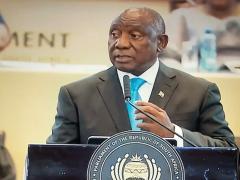Africa’s reputation of extreme droughts and flooding, or starvation due to climate change, is disheartening but it is not the full story.
The Rockefeller Foundation Global Economic Recovery is working to shift this perspective, striving to represent Africa as a potential climate champion.
According to the 2022 Global report on Food Crisis, about 140 million people on the continent face severe food insecurity.
Flooding inevitably leads to health crises, as it exacerbates the spread of cholera, malaria, Dengue fever and other diseases.
Energy crises also plague African countries, with almost 600 million people with no access to electricity. Although this arises due to lack of investment, it also means that Africa contributes less than 3% to global carbon dioxide emissions and has the lowest emission per capita in the region.
Lastly, as in many other countries, Covid put further pressure on African governments and economies, resulting in inflation, supply-chain issues due to recent wars, and negative impacts due to climate change. In December 2022, the International Monetary Fund and World Bank declared 22 African countries to be in debt distress or at risk of being in debt distress.
However, by supporting intra-African trade, restructuring banks and investing in public healthcare, the continent can potentially become a leading example of the management of climate change.
This could start by restructuring global financial architecture and debt, mainly by encouraging multilateral national banks not to act as commercial banks would. By doing so, low-and-medium-income countries will have more access to capital at reasonable interest rates.
It would also require the support and facilitation of African Continental Free Trade Area work across all 54 countries on the continent. Africa has enough resources to provide its own food, fertilizer, minerals and much more, yet intra-African trade has not flourished.
Lastly, the Foundation recommends that investment into African health care systems should be encouraged, particularly due to the impact of climate change and the resultant susceptibility. The African Union said it would hire two million more healthcare workers by 2030.
The Rockefeller Foundation believes that, by facilitating public-private partnership in this process, professional healthcare cadres can be expanded, and communities of healthcare workers will be able to efficiently collect and share data to be analysed for trends and used to identify solutions.
The Foundation speculates that, with these issues attended to and invested in, Africa could be a potential climate champion and key partner by becoming more prosperous and resilient to the effects of climate change, creating a more affluent and healthy continent.













